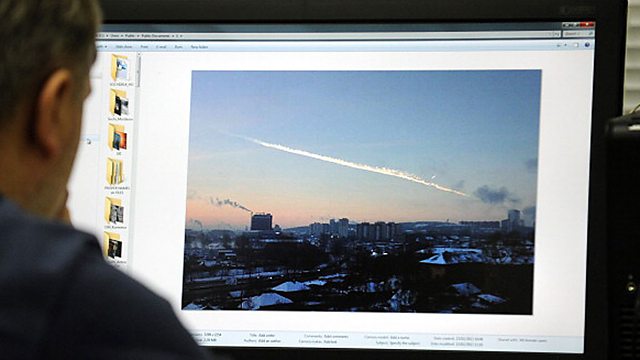Asteroid Hit Rate Underestimated
Chelyabinsk event sized meteors may strike Earth more frequently than first thought; Immunity and circadian rhythms; Bladder control device; India launches Mars Orbiter.
Scientists have been busy analysing the data received from the Chelyabinsk meteor strike on 15 February 2013. The explosion was equivalent to about half a million tonnes of TNT explosive – around 30 times the explosive power of the bombs that were dropped on Japan at the end of World War Two. Now, Professor Peter Brown and colleagues at Western University in Ontario, Canada, along with researchers in Russia, reveal more about the origin of the Chelyabinsk airburst event, alongside a 20-year analysis of similar-sized strikes that indicates these events may occur every 30 – 40 years rather than every 150 years as previously thought.
Circadian Clock Linked to Immune System
Anybody who has worked an overnight shift or flown across several time zones will know the phenomenon of jetlag, where our internal clocks get out of sync with the sun. There is some evidence that people who spend a lot of time in this state may suffer more from inflammatory diseases such as rheumatoid arthritis or bowel problems. New work published in the journal Science shows one way that link might work. Professor Lora Hooper from The University of Texas Southwestern Medical Centre joins Science in Action from Dallas.
Bladder Control Device
For someone with a spinal cord injury, not being able to move your limbs is an obvious problem. But many patients also lose internal functions like bladder control. This week, scientists at the University of Cambridge in the UK detail an electrical device that could one day allow paralysed patients to regain that control. Reporter Kerri Smith spoke to Dr Daniel Chew, lead author of the research paper published in Science Translational Medicine.
India Launches Mars Orbiter
The Mangalyaan mission successfully blasted off this week from the Sriharikota spaceport in Andhra Pradesh, India. If it makes it to the Red Planet later next year, the probe will orbit Mars, studying the planetary surface and atmosphere, and will be a major step for the nation. However, some commentators have questioned whether a country with one of the highest rankings for childhood malnutrition in the world should be spending millions on a space programme at all. Angela Saini, author of Geek Nation: How Indian Science Is Taking Over The World, joins Science in Action to discuss the heritage and benefits of India’s Space Research Organisation.
(Photo: A man looks at a computer screen displaying a picture reportedly taken in the city of Chelyabinsk on 15 February 2013, showing the trail of a meteorite above a residential area © AFP/Getty Images)
Last on
More episodes
Previous
Chapters
-
Asteroid Hit-Rate Underestimated
Chelyabinsk event sized meteors may strike Earth more frequently than thought.
Duration: 05:21
Immunity and Circadian Rhythms
Possible link between disrupted body clocks and immune systems.
Duration: 02:54
Bladder Control Device
A device that could one day allow paralysed patients to regain bladder control.
Duration: 02:06
India Launches Mars Orbiter
We discuss the heritage and benefits of India’s Space Research Organisation.
Duration: 06:23
Broadcasts
- Thu 7 Nov 2013 20:32GMT�鶹������ҳ��� World Service Online
- Fri 8 Nov 2013 02:32GMT�鶹������ҳ��� World Service Online
- Fri 8 Nov 2013 09:32GMT�鶹������ҳ��� World Service Online
- Sat 9 Nov 2013 14:32GMT�鶹������ҳ��� World Service Online
- Mon 11 Nov 2013 04:32GMT�鶹������ҳ��� World Service Online
Podcast
-
![]()
Science In Action
The �鶹������ҳ��� brings you all the week's science news.


